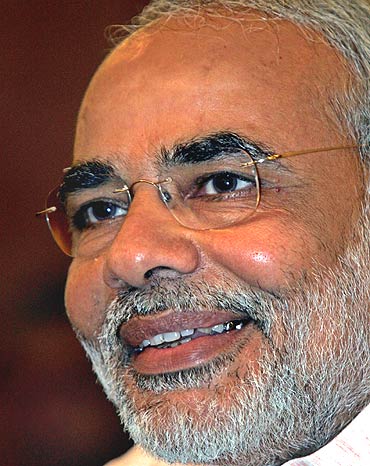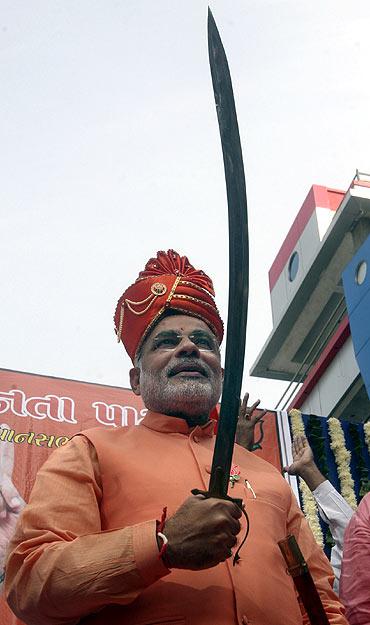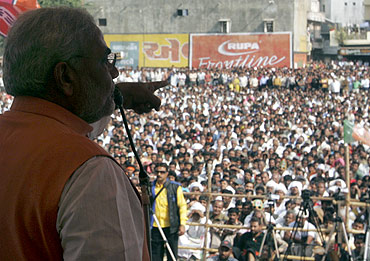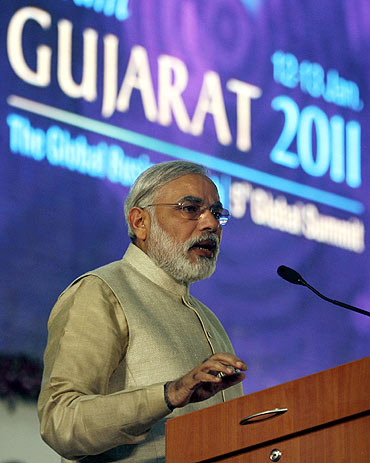
Senior analyst B Raman feels that the so called 'secular' Narendra Modi bashers are doing a great disservice to India by quarantining the Gujarat chief minister in his past. Instead, the youth power should support Modi's Gujarat development model so that it spreads to other parts of the country.
The storm in the tea cup raised by some so-called secular elements over the praise by social activist Anna Hazare of the rural development achievements of Narendra Modi, their whipping-boy, in his state of Gujarat underlines once again the determination of these elements to keep Modi quarantined in his past.
All sections of the population of Gujarat -- whatever be their religion or language -- have benefited from the efficient, corruption-free and people-friendly administration given by Modi to the state for the last three or four years.
The results achieved by him comparable to the results achieved in western China -- but not yet in coastal China -- demonstrate that we can catch up with China earlier than anticipated if only we had leaders with the kind of motivation, determination and vision that Modi has shown in developing Gujarat.
Please click NEXT to read further...

Unfortunately, the so-called secular elements would rather keep Gujarat and the rest of the country backward and lagging behind China than acknowledge the record of Modi and let his Gujarat model of development become an Indian model.
The so-called secular elements that have taken up sword against Modi have only one objective -- keep him quarantined in his past and stop him from playing any role at the national level even if such a role would be of benefit to the country.
The venom and hatred, which these elements keep spreading against him, are because of his strong Hindutva ideology, which is anathema to them, and his perceived sins of commission and omission during the horrendous acts of violence against India's Muslim co-citizens in the aftermath of the massacre of a number of Hindu pilgrims by some Muslims at the Godhra railway station in Gujarat in the beginning of 2002.

There has been a perception -- not unjustified -- that Modi did not, in the initial stages, deal with the explosive situation vigorously in order to protect the members of the Muslim community from brutal and beastly reprisal attacks by the Hindus.
The fact that the police subsequently took vigorous action to protect the Muslims -- as evidenced by the large number of Hindus killed in police-firing -- would not mitigate from the fact that in the initial hours after the news of the Godhra massacre spread across the state, the administration dragged its feet in protecting the Muslims, thereby wittingly or unwittingly giving a free run to frenzied Hindu mobs.
It was a horrible episode of which all of us have to be ashamed.

After the frenzy of the initial hours, the state administration did move in vigorously to bring the situation under control.
The fact that no effective action was taken in the initial hours has left a scar in the minds and hearts of Muslims.
This scar is likely to take a long time to heal. The cases registered in connection with the brutal attacks on the Muslim community are under investigation or prosecution. The investigation so far has not produced any evidence of complicity by Modi.
Under these circumstances, the right thing would have been to let the law take its course in the cases registered and proposed to be registered and let Modi continue on the path of development of the state and not stand in the way of the aspirations of people, who want to see him play a much a larger political role at the national level so that the country as a whole benefits from the kind of efficient administration he has given Gujarat.

Modi enjoys the unqualified support of large sections of the Gujarat population and is increasingly admired for his drive and administrative acumen in other parts of the country too by people who can by no means be called Hindutva ideologues.
People, who look up to him and want him to increasingly play a pan-Indian role, are nationalists and as much secular in their outlook and beliefs as the so-called secularists whose main preoccupation has become stopping Modi at every stage.
They are concerned over the slow rate of development, over the aggravating internal security situation and over India lagging behind China.
They feel that the type of governance and leadership that Modi has provided to the people of Gujarat needs to be tried out in other parts of India too, but these so-called secular elements are not prepared to let Modi play his due role for the development of the country.
The unexpected success of the Anna Hazare movement in the initial stages of the battle against corruption was made possible by the assertion of youth power in support of his movement.
There is a need for a similar assertion of youth power in support of the development model as experimented with in Gujarat by Modi and for its spread to other parts of India.
The 'Stop Modi Movement' by these elements has to be stopped and rolled back. Only youth power can do it.